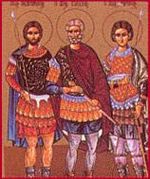Andronicus, Probus, and Tarachus
This article needs additional citations for verification. (April 2020) |
Saints Andronicus, Probus, and Tarachus | |
|---|---|
 | |
| Martyrs | |
| Born | c. 239 (Tarachus) |
| Died | 304[1] Tarsus, Asia Minor (modern-day Tarsus, Mersin, Turkey) |
| Venerated in | Roman Catholic Church, Greek Orthodox Church Romanian Orthodox Church |
| Canonized | Pre-congregation |
| Feast | October 11 (Roman Catholic Church), October 12 (Greek Orthodox Church) |
| Attributes | Tarachus is depicted as an elderly man, in the robes of a Roman citizen, with a spear. The others are depicted with crosses or spears. |
Andronicus, Probus and Tarachus (Greek: Άνδρόνικος, Πρόβος καί Ταράχος) were martyrs of the Diocletian persecution (about 304 AD). According to tradition, Tarachus was beaten with stones. Probus was thrashed with whips, his back and sides were pierced with heated spits; finally he also was cut up with knives. Andronicus was also cut to pieces with knives.
Narrative
[edit]According to the Acts, Tarachus (c. 239- 304), a Roman who was a native of Claudiopolis in Isauria and a former soldier,[2] the plebeian Probus of Side in Pamphylia, and the patrician Andronicus, who belonged to a prominent family of Ephesus, were tried by the governor Numerian Maximus and horribly tortured three times in various cities, including Tarsus, Mopsuestia, and Anazarbus of Cilicia.[3]

According to tradition, Tarachus was beaten with stones. Probus was thrashed with whips, his feet were burned with red hot irons, his back and sides were pierced with heated spits; finally he also was cut up with knives. Andronicus was also cut to pieces with knives.[4]
They were then condemned to death by wild beasts, and when the animals would not touch them in the amphitheatre they were put to death with the sword. Three men, named Marcian, Felix, and Verus, witnessed their martyrdom and added an epilogue to the saints' Acts. They retrieved the bodies of the three saints, buried them, and watched over them the rest of their lives, requesting that they be buried in the same vault as the martyrs at the end of theirs.[5]
There are two accounts of their martyrdom, the first account being held by Thierry Ruinart to be entirely authentic. Harnack, however, expressed doubts as to the genuineness of the account, and Hippolyte Delehaye puts the martyrdom in the class of legends of martyrs that he calls "historical romances".[3]
Their feast is celebrated in the Roman Catholic Church on October 11, and in the Greek Orthodox Church on October 12.
See also
[edit]References
[edit]- ^ Dumitraşcu, Iulian. "Martyrs Probus, Tarachus & Andronicus; Holy Hierarch Cosmas, bishop of Maiuma", Biserica Ortodoxă Română, October 12, 2021
- ^ "Martyrs Probus, Tarachus, and Andronicus, at Tarsus in Cilicia", Orthodox Church in America
- ^ a b Kirsch, Johann Peter. "Sts. Tarachus, Probus, and Andronicus." The Catholic Encyclopedia Vol. 14. New York: Robert Appleton Company, 1912. 16 April 2020
 This article incorporates text from this source, which is in the public domain.
This article incorporates text from this source, which is in the public domain.
- ^ "Provos, Andronicus, & Tarachos, Martyrs of Tarsus", Greek Orthodox Archdiocese of America
- ^ Butler, Alban. "SS. Tarachus, Probus, and Andronicus, Martyrs", The Lives of the Saints. 1866
 This article incorporates text from a publication now in the public domain: Kirsch, Johann Peter (1912). "Sts. Tarachus, Probus, and Andronicus". In Herbermann, Charles (ed.). Catholic Encyclopedia. Vol. 14. New York: Robert Appleton Company.
This article incorporates text from a publication now in the public domain: Kirsch, Johann Peter (1912). "Sts. Tarachus, Probus, and Andronicus". In Herbermann, Charles (ed.). Catholic Encyclopedia. Vol. 14. New York: Robert Appleton Company.
External links
[edit]- (in English) Provos, Andronicus, and Tarachos
- (in English) Lives of the Saints
